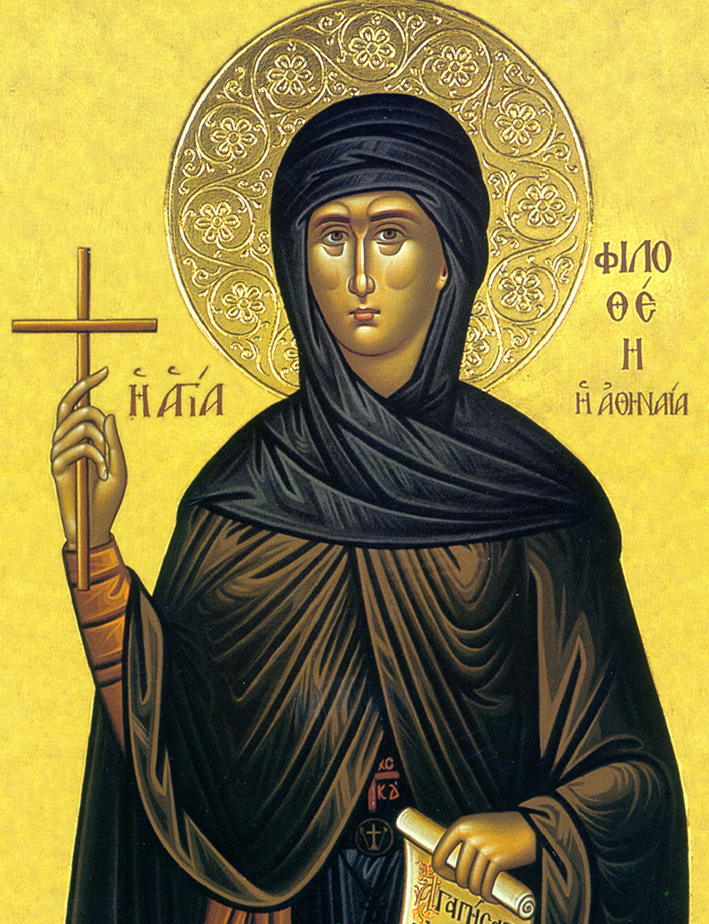Translation from the Book
Ὁ Θεός στήν ἱστορία τῆς Ἐκκλησίας, Βοήθημα Κατωτέρου Κατηχητικοῦ Γ΄,
ἐκδ. «Χριστιανική Ἐλπίς» Ὀρθόδοξη Ἀδελφότητα, Θεσσαλονίκη 2016, σσ. 136-140
During March, the month we are in, we celebrate a bright and glorious double feast: the 25th of March! We rejoice over two joyful events, both for our faith and our homeland: the Annunciation of the Theotokos and the Greek War of Independence in 1821.
Today, we will see a different kind of revolution — one that took place even before the Revolution of 1821. It has been called a “revolution of love”. The leader of this revolution was a woman — Saint Philothei, also known as “the Lady of Athens”.
In 1522 AD, in Ottoman-occupied Athens, a little girl named Regoula was born into the noble Benizelos family. Her wealthy and devout parents, Angelos Benizelos, a leading figure in the city, and Syriga Palaiologou, took special care in raising their beloved and only daughter with a strong Christian upbringing and education. Even from a young age, Regoula stood out for her intelligence and kindness.
When she was still very young, her parents arranged her marriage to one of the noblemen of Athens. However, just three years after the wedding, her husband passed away. Regoula was left a widow but chose not to marry again. Deep in her heart, she held a strong desire: to give all her wealth and her whole life to Christ, whom she deeply loved, and to the suffering people of her homeland.
She truly did this — in the heart of the city of Athens, she founded a unique kind of monastery. Inside this monastery, she established:
✓ A school where Greek children, living under Ottoman rule, could learn to read and write
✓ A workshop where young girls were taught sewing and weaving skills
✓ A shelter where Greek women could find refuge from the dangers they faced under Turkish oppression.
The monastery of this noble Athenian lady became like a great open embrace. Who ever left there with empty hands? Who left still hungry? What elder, orphan, or person in pain didn’t find comfort? Regoula herself, now the abbess with the name Philothei, along with the other nuns, generously offered their love. They gave all their property and all their lives to this great purpose: to love God and to spread His love all around them. Tirelessly, they worked all day and prayed fervently late into the night. In enslaved Athens, their monastery shone like a lit candle, offering hope and light to the poor slaves.
But the Turkish conquerors could not tolerate this light. They wanted to extinguish it by force. The Ottoman authorities ordered that Philothei be arrested. She was thrown into prison and cruelly tortured. Fortunately, the leading citizens of Athens intervened and managed to secure Philothei’s release from prison.
What did Philothei do next? Did she stop her work? Of course not! This is what she lived for — to love God and to care for all those in pain. Her love flowed everywhere like a rushing stream!
 But soon, another order was given for her arrest. It was the night of October 2nd, 1588. The next day was the feast of Saint Dionysios the Areopagites, the patron saint of Athens. In one of the monastery’s chapels, an all-night vigil was being held. Philothei was there, praying, when suddenly a group of Turks rushed into the church. They dragged her outside violently and began to whip her savagely. Her body was covered in wounds. Yet they did not stop beating her until they left her nearly dead. She was so badly injured that, despite the loving care of those around her, she could not recover. A few months later, on February 19th, 1589, she passed away.
But soon, another order was given for her arrest. It was the night of October 2nd, 1588. The next day was the feast of Saint Dionysios the Areopagites, the patron saint of Athens. In one of the monastery’s chapels, an all-night vigil was being held. Philothei was there, praying, when suddenly a group of Turks rushed into the church. They dragged her outside violently and began to whip her savagely. Her body was covered in wounds. Yet they did not stop beating her until they left her nearly dead. She was so badly injured that, despite the loving care of those around her, she could not recover. A few months later, on February 19th, 1589, she passed away.
Each year on this day, our Church honors her memory. Her holy relic is kept in the Metropolitan Cathedral of Athens. Some areas of Athens are named after her: Filothei, Kalogreza, and Psychiko. The area called Psychiko got its name from a kind deed — a “psychiko” — that the kind-hearted Saint Philothei once did there. She paid to have a well built in that spot. She knew many people would pass by on their way into the city from nearby villages, and she wanted to quench their thirst! How many wonderful things can be imagined and achieved by a soul that truly loves God!
A Sacrifice for Christ and the Homeland
During the difficult years of the Ottoman occupation in our homeland, many people, like Saint Philothei, chose to sacrifice their lives rather than deny their faith. They are called Neomartyrs because they were martyred in the more recent centuries of our history. The Neomartyrs are like blooming flowers in the middle of a harsh winter, like bright candles glowing in the deep darkness of slavery! They kept the flame of love for Christ and for their homeland burning strong in their hearts. If they had not existed, perhaps we would not be living today in a free and Orthodox Greece.
And it is true: whoever loves Christ also cares deeply for their homeland. Whoever belongs to Christ is ready to make sacrifices for others. Saint Philothei gave up everything — both her wealth and her life. The love of Christ gave her so much strength and courage!
Would you like to be like Saint Philothei — to have her bravery and her love? Even though you are still young, still in primary school, if you start now to love Christ and your country, if you begin today to make small sacrifices for others, then we can hope that, in the years to come, our history will again be able to show us great heroes — and they will come from you! And then, no matter how many trials it faces, our beloved Greece will never be lost!









